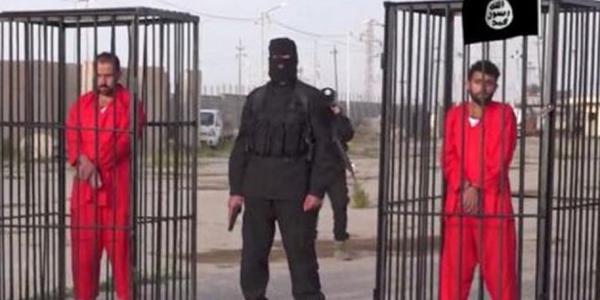Don’t blame Snowden for the ISIS fiasco
Michael Young/The Daily Star/Feb. 26, 2015
It was only a matter of time before an American official would use the ISIS stick against the former National Security Agency contractor Edward Snowden. The head of the NSA, Adm. Michael Rogers, told a group this week, “I would say that [the Snowden leaks have] had a material impact on our ability to generate insights as to what counterterrorism, what terrorist groups around the world are doing.” Rogers only echoed what the former deputy chief of the NSA, Chris Inglis, told the Washington Times last September. He had stated that Snowden’s disclosures “went way beyond disclosing things that bore on privacy concerns. ‘Sources and methods’ is what we say inside the intelligence community – the means and methods we use to hold our adversaries at risk, and [ISIS] is clearly one of those.”
The remarks were perhaps true, but also misleading. For one thing, from what we are hearing, most intelligence agencies are well-informed about individuals who may pose a domestic threat due to their sympathies with jihadi organizations. In the case of the Kouachi brothers who committed the Charlie Hebdo attack in France, the problem was not the absence of information; it was the inability of the police and intelligence agencies to act on information they had. Whether Snowden had leaked on U.S. surveillance capacities or not, ISIS would certainly have assumed that such capacities existed, and adapted accordingly. In his book “Body of Secrets” on the NSA, James Bamford wrote that agency officials would routinely play intercepts of conversations between Osama bin Laden and his stepmother to visiting congressmen to get more funding for eavesdropping activities. Someone as paranoid as Abu Bakr al-Baghdadi, whose ability to plan his actions off the radar were honed in U.S. prisons in Iraq, surely did not need Snowden to know that he had to communicate surreptitiously .
What Rogers and Inglis avoided saying was whether the Obama administration had properly judged the ISIS danger. The NSA likes to collect as much information as it can, which is why it crossed the line and began to accumulate the personal data of millions of people, including many Americans. But how that material is transformed into action by policymakers is another matter altogether. Let’s look at ISIS. The Obama administration and intelligence agencies had plenty of time to assess the group by the time it captured Mosul in June 2014. Both ISIS and the Nusra Front had come on the scene years earlier in different organizational forms. Yet the administration was so determined to avoid involvement in Syria – “somebody else’s civil war,” as President Barack Obama disgracefully put it – that it failed to adequately respond to the arrival of ISIS.
Obama had a case that the United States would only lose from being drawn into the Syrian conflict, but that did not mean he was off the hook in evaluating potential threats to America and its allies. Worse, in 2011 Obama’s reluctance to undermine President Bashar Assad by helping the rebels was motivated by a fear that the ensuing vacuum could favor jihadis. In other words, the White House had adopted a template of carefully watching extremist groups in Syria, but still did nothing to hinder ISIS, for instance by arming its foes.
By the time Mosul fell, the ISIS phenomenon had far transcended the confines of Iraq or Syria, as the group had built a sophisticated system of financing and recruitment. America reacted with airstrikes, but it was too late. Having ignored Syria for domestic political reasons, the administration simply refused to consider the serious consequences of the war there for regional and global security. Today, Obama apparently prefers to keep Assad in power, again fearing that jihadis would benefit from a void. Nor is he alone. After the Charlie Hebdo massacre the French sent an envoy to Damascus to discuss anti-terrorism cooperation. While neither Washington nor Paris wants to give Assad and his regime legitimacy, their reluctance to see him overthrown will only reinforce the appeal of extremist groups among those Syrians seeking Assad’s removal.
All this has had nothing to do with Snowden. It was the disastrous policies of the Obama administration that, partly, allowed ISIS to thrive.
It was never about the United States sending troops to Syria, as Obama falsely depicted his options in Syria. ISIS grew because the U.S. failed to properly evaluate a conflict that had spun out of control. So when Rogers blames Snowden for crippling the NSA’s ability to generate insights on ISIS, he’s uttering nonsense. There was plenty of open source material allowing a highly credible appraisal of the group, but the administration simply delayed responding.
Some have suggested that the Obama administration has been Machiavellian in Syria, allowing its enemies to grind each other down. But was creating conditions for the advent of an Al-Qaeda on steroids the aim? The United States has spent the last decade developing a huge and invasive infrastructure to fight terrorism, but all ISIS has done is to show the profound limitations of the American efforts. The NSA’s appetite for money is insatiable, so one expects it to target Snowden. The organization would do better to question the U.S. president, who has systematically misread Syria, as have those around him. They’re the ones who deserve condemnation, not Edward Snowden.
**Michael Young is opinion editor of THE DAILY STAR. He tweets @BeirutCalling.






















